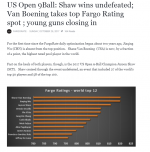To make this short......would you take Siming even against Sky Woodward, Rodney Morris, Ralph Souquet, Nick Vandenberg, Corey Deuel, Thorsten, Earl, Mika, Archer, John Morra, Kiamco, Billy Thorpe.........etc??
They are all within 10 points of Siming's fargo rate.
According to your post, you have a lot of faith there are enough connections in which to accurately asses her rating, therefore she's even money against all those players. So would you honestly be comfortable wagering a large amount of money(hypothetically, I'm not making this about action) on her against all those within 10-20 fargo points?
This is going to be long. Let's start by listing their fargoratings as of this moment to make the discussion easier.
Siming Chen 778
Warren Kiamco 788
John Morra 788
Mika Immonen 788
Sky Woodward 785
Ralf Souquet 784
Nick VanDenBerg 783
Rodney Morris 779
Earl Strickland 778
Thorsten Hohmann 777
Corey Deuel 776
Johnny Archer 772
Billy Thorpe 764
1. Fargorate has a margin for error that is usually probably less than 5 or so points but that can in some specific cases be much more, such as when a player's abilities are rapidly improving or declining, or when a player doesn't have enough games in the system, and other cases such as those.
2. Unless I have current extraneous info that I believe will make a difference, such as who has the flu, who is jet lagged or tired and doesn't play well tired, who seems to have who's number, who had their dog die yesterday, who plays better under a certain type of pressure etc, then I don't tend to bet on the player who is less favored to win so no I wouldn't be betting on Siming against any of those people who are rated higher than she is, which is everybody from Rodney on up.
3. I don't tend to bet on coin flips either because coin flips are for suckers. With the margin for error taken into consideration that rules out everybody from Johnny on up.
4. That leaves Thorpe, who is rapidly improving and because of this he is underrated a bit by fargo IMO. The way fargo works, anybody rapidly improving or declining in skills will always have fargo trailing behind a little trying to "catch up" to what their true rating really is due to the nature of how they average all performances over the last ten years if they have history that goes back that far. In Thorpes case, results from when he was not nearly as good as he is now are still being averaged in and his true rating is not quite being reflected yet. Fargo largely addresses this issue by more heavily weighing results the more recent they are but the old results from when he wasn't nearly as good are still able to have a little effect and I am guessing his true level of play is mid 770s-ish now, and with the margin for error that puts him in the coin flip category with Siming as well and as said before I don't tend to sucker bet on coin flips.
5. Because of the small margin for error in ratings, and because of the variances in how people perform on any given day, you probably need to see something like at least a 10 point or more difference in ratings in my estimation before you can even begin to feel that someone has even a slight edge in a match up enough to be worth betting on, particularly if it isn't a really long race or ahead set.
So would I bet any of these matches? Nope, but not because I don't believe their ratings are pretty accurate, but because all those matches are either coin flips where either could win on any given day or they show her as the clear underdog who is going to lose a bit more often than she wins.

